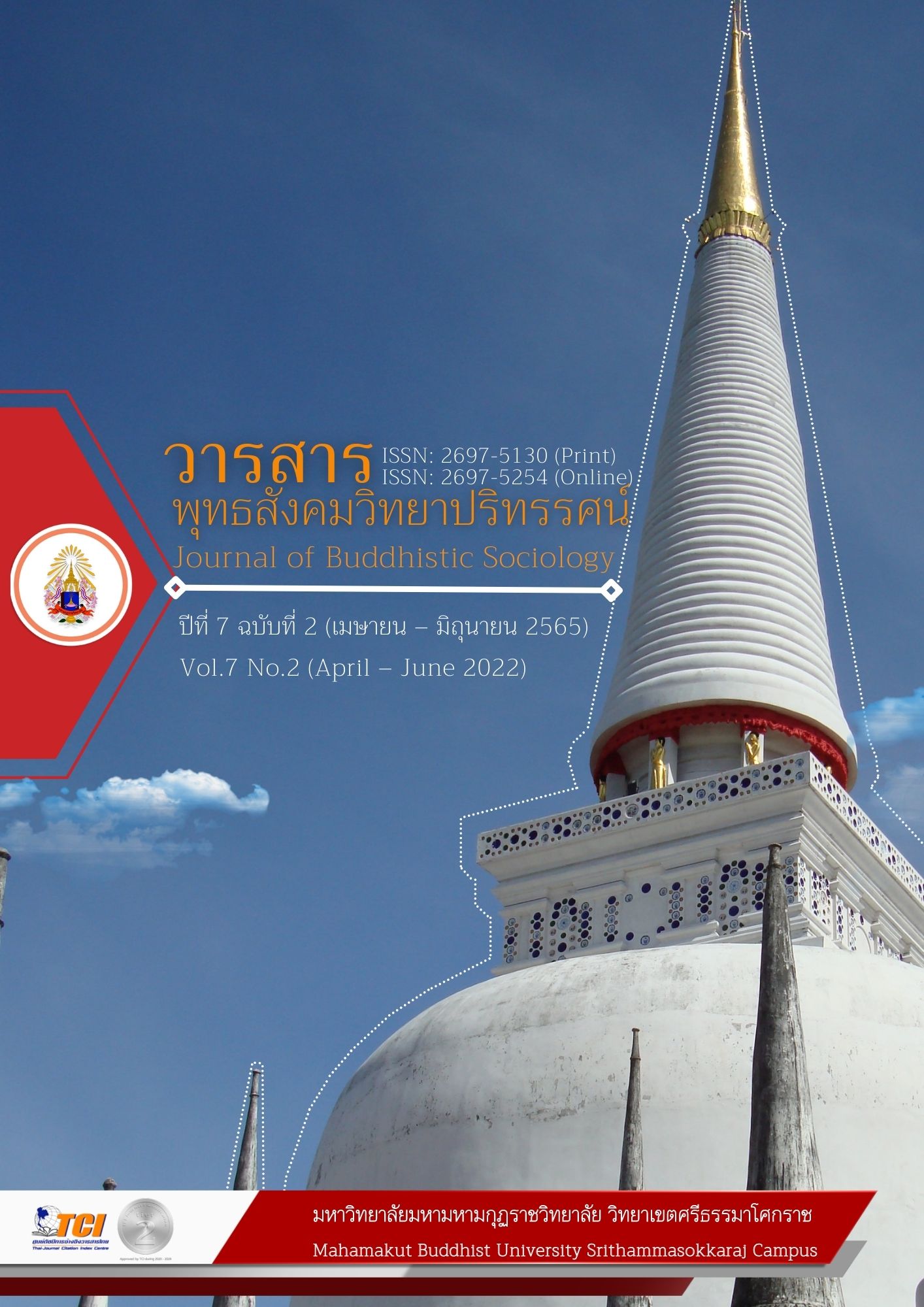INTEGRATION OF BUDDHIST PRINCIPLES FOR IMPROVING THE QUALITY OF LIFE OF THE ELDERLY IN LOCAL ADMINISTRATIVE ORGANIZATIONS, CHANTHABURI PROVINCE
Main Article Content
Abstract
This research aimed to 1) study the quality-of-life development of the elderly, 2) study the causal relationship for the quality-of-life development of the elderly, and 3) present a model of the integration of Buddhist principles for improving the elderly's quality of life in local administrative organizations, Chanthaburi Province. This mixed research was composed of quantitative and qualitative research. For quantitative research, the researcher used a questionnaire with total reliability of 0.952. Data were collected from the sample group: 390 people of the elderly in the area of the sub-district municipality and the sub-district administrative organization that has schools for the elderly in Chanthaburi province. Data were analyzed to find the frequency, percentage, mean, standard deviation, and Structural Equation Model: SEM using Confirmatory Factor Analysis: CFA. The researcher employed in-depth interviews with 17 key informants for the qualitative research, the data were analyzed using descriptive and content analysis, and focus group discussion was employed with nine experts to confirm the model after the synthesis.
The results of the research were as follows;
1. Overall, the quality-of-life development of the elderly in local administrative organizations in Chanthaburi Province was high.
2. The analysis results of the causal relationship for the development of the elderly's quality of life in the local administrative organizations in Chanthaburi Province showed that the quality-of-life and welfare development for the elderly through the Trisikkha principle affected the quality-of-life development of the elderly of the local administrative organizations in Chanthaburi province by 40 percent.
3. The model of integrating Buddhist principles for the development of the elderly's quality of life in local administrative organizations in Chanthaburi Province was as follows: there were two fundamental factors for the quality-of-life development of the elderly: integrating the Trisikkha principle to promote the quality-of-life development of the elderly.
Article Details

This work is licensed under a Creative Commons Attribution-NonCommercial-NoDerivatives 4.0 International License.
References
กรมส่งเสริมการปกครองส่วนท้องถิ่น. (2563). ข้อมูลพื้นฐานของสำนักงานส่งเสริมการปกครองส่วนท้องถิ่นจังหวัดจันทบุรี. เรียกใช้เมื่อ 2 ตุลาคม 2563 จาก http://chanthaburilocal.go.th/public.
โกนิฏฐ์ ศรีทอง และคณะ. (2546). การพัฒนาคุณภาพชีวิตตามแนวพุทธศาสตร์: กรณีศึกษาวัดอัมพวันจังหวัดสิงห์บุรี. ใน รายงานการวิจัย คณะสังคมศาสตร์. มหาวิทยาลัยมหาจุฬาลงกรณราชวิทยาลัย.
ประมวล คิดคินสัน. (2555). วัยท้าย วัยทอง. กรุงเทพมหานคร: แพร่พิทยา.
ปรีชญา เทพละออง. (2561). ปแบบการพัฒนาสุขภาวะองค์รวมเชิงพุทธสาหรับชมรมผู้สูงอายุ. วารสารบัณฑิตศึกษาปริทรรศน์, 14(ฉบับพิเศษ), 206-217.
พระมนตรี กิจฺจสโร (วิโรจะ). (2561). การปรับใช้หลักไตรสิกขาเพื่อการพัฒนาคุณภาพชีวิตของนักเรียนโรงเรียนศรีวิไลวิทยา อำเภอศรีวิไล จังหวัดบึงกาฬ. วารสารธาตุพนมปริทรรศน์, 2(2), 99-100.
พระสุนทรกิตติคุณ. (2560). หลักพุทธธรรมกับการดูแลสุขภาพแบบองค์รวมในผู้สูงอายุ. วารสารมหาจุฬาวิชาการ, 3(1), 11-25.
มหาวิทยาลัยมหาจุฬาลงกรณราชวิทยาลัย. (2539). พระไตรปิฎกภาษาไทย ฉบับมหาจุฬาลงกรณราชวิทยาลัย. กรุงเทพมหานคร: โรงพิมพ์มหาวิทยาลัยมหาจุฬาลงกรณราชวิทยาลัย.
รศรินทร์ เกรย์ และคณะ. (2556). มโนทัศน์ใหม่ของนิยามผู้สูงอายุ: มุมมองเชิงจิตวิทยาสังคมและสุขภาพ. นครปฐม: สถาบันวิจัยประชากรและสังคมมหาวิทยาลัยมหิดล.
ศากุล ช่างไม้. (2550). สังคมไทยกับสถานการณ์ผู้สูงอายุในปัจจุบันและอนาคต. กรุงเทพมหานคร: มติชน.
สมโภชน์ อเนกสุข. (2548). รูปแบบการดำรงชีวิตของผู้สูงวัยอายุเกิน 100 ปี จังหวัดชลบุรี. วารสารศึกษาศาสตร์, 17(1), 95-107.


